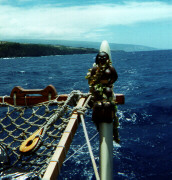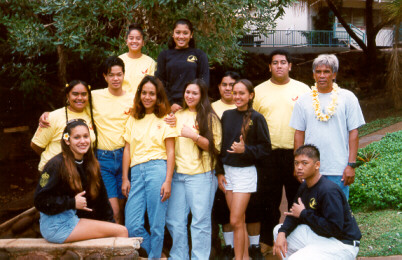
Interview with the crew of the Hokule`a on October 7, 1999
(The day before siting Rapa Nui)Written by D. Fujiwara
Thursday the 7th of October was a day I will never forget. It was during my Travel Academy period that my classmates and I communicated with the crew of the Hokule`a, which was truly an unforgettable experience.
Nainoa Thompson reported that the clouds and no moon are making it difficult to determine their position. Nainoa hopes that the skies will clear so that they can find their latitude. They are currently tacking to the east heading for `Aina Malanai -- two houses south of east.

Some questions asked...
How far do you think you are from Rapa Nui? 200 miles
How long and what were some of the preparations taken, including physical and mental? Chad Baybayan replied, "you must be in your best physical shape because there are a lot of risks."
Being a woman on the Hokule`a, is it hard to be hygienic? NO! It is not hard. Women are treated just like the rest of the crew but when it comes to their feminine concerns, they are given a lot of space and respected.
Has there ever been a time when you wanted to give up? "Never," Chad said. To learn about all of this is a great way to help fight to keep Hawai`i's culture strong.
What inspired you to go through the whole program and did it take long to adapt to your surroundings? Chad started 24 years ago and believes that sticking with the program has been a great experience and closing the Polynesian triangle today is even more of a moment worth treasuring.
Besides fresh fish, what kinds of dishes do you eat and how do you keep the food from spoiling? They have recently caught mahimahi and they fry it, sashimi it or dry it. Their main way of preserving is through dehydration, or drying.
What kind of sicknesses are most common on the canoe and how do you treat them? Dr. Dan Tamura reported that there are no sicknesses on board. Everyone is screened to ensure that they are fit to make it through the trip. More common are injuries like sprains and cuts and seasickness during the first week.
What kinds of things do you do to keep yourself busy in your leisure time?
There is hardly a moment that you are not doing something. You are always working and if you're not working hard or writing in your journal, you are exhausted and sleeping.
In closing, Chad believes that this trip is exciting and a dream come true. He also talked with his daughter Pukanala, a current freshmen in our boarding program.
On behalf of our Lahainaluna Voyaging program, we would like to thank the Hokule`a crew and the Polynesian Voyaging Society for your time and inspiration that you've instilled in us to learn more about our heritage. You inspired us to find out how and where our ancestors traveled. Thank you for giving us this priceless gift of knowledge. Mahalo a nui loa!
